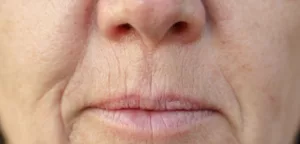Why does the skin, age so quickly? How can the ageing process be slowed?
The skin is the largest organ in the body, but it is continually exposed to a variety of environmental and lifestyle factors that may speed up the ageing process. While everyone ages naturally, there are some things that can speed up the process and cause wrinkles, fine lines, age spots, and other telltale signs of ageing. In this post, we’ll look at the top 9 causes of skin ageing and discuss what you can do to delay it.
Solar Exposure
Exposure to ultraviolet (UV) light from the sun is one of the main factors in the ageing of the skin. UV rays can enter the skin and harm the collagen fibres, causing the skin to lose its suppleness and develop wrinkles and fine lines. Age spots, discolouration, and even skin cancer can all be brought on by sun damage. Wear sunscreen daily, stay away from tanning beds, and seek cover during the hottest part of the day to protect yourself from sun damage.
Smoking
Another important element that might speed up the ageing process of the skin is smoking. The collagen and elastin fibres in the skin can be harmed by the chemicals in cigarette smoke, resulting in wrinkles and fine lines. Additionally, smoking can decrease blood flow to the skin, leaving it with a lifeless complexion. Quitting smoking can slow down the ageing process and enhance your skin’s general health if you smoke.

Bad Diet
The rate at which your skin matures can also be significantly influenced by your diet. Inflammation brought on by a diet high in processed foods and sugar can lead to oxidative stress and skin damage. Your skin can acquire the nutrients it needs to stay healthy and youthful by eating a nutritious, well-balanced diet that includes lots of fruits and vegetables.

Dehydration
Dehydration can make your skin appear lifeless and drab and can also play a role in the development of wrinkles and fine lines. Your skin becomes less elastic and supple when you are dehydrated, making it more vulnerable to environmental damage. Drink a lot of water throughout the day and limit your intake of alcohol and caffeine to maintain moisturised skin.
Stress
Your skin can suffer from stress in a number of ways. The skin’s collagen and elastin fibres may break down as a result of the inflammation it can induce. Stress can also make it difficult for you to sleep, which can result in puffy eyes and a tired, worn-out appearance. Try to use stress-relieving exercises like yoga or meditation, and make sure you get enough sleep each night.

Pollution
Another environmental component that might speed up the ageing process of the skin is pollution. Air pollution can harm the skin’s barrier of defence, causing oxidative stress and inflammation. Avoid spending too much time in heavily polluted locations and use skincare products containing antioxidants to help fight free radicals in order to protect your skin from pollution.
Sleep Deprivation
Sleep is crucial for maintaining healthy skin since it is while you sleep that your skin regenerates and heals itself. This process can be hampered by sleep deprivation, which can result in fine lines, dark circles, and a tired, worn-out appearance. Create a relaxing bedtime routine, try to stick to a regular sleep schedule, and avoid using electronics right before bed to improve the quality of your sleep.
Genetics
In addition to genetics, lifestyle factors have a big impact on how rapidly your skin ages. It’s possible that some people age more quickly than others due to genetic predispositions, with elements including collagen formation, skin pigmentation, and thickness all contributing. While there is nothing you can do to alter your genetic makeup, there are things you can do to slow down the ageing process through your lifestyle and skincare routine.
Hormones
Hormones’ effects on collagen can cause the skin to age. The protein collagen gives the skin its shape and flexibility. Hormone levels fall as we age, which may result in less collagen being produced. In particular, oestrogen is essential for preserving the skin’s collagen levels. Skin that is thinner, drier, and less elastic may be the result of its deterioration during the menopause.
Hormonal imbalances can also cause collagen to break down, which results in fine lines, wrinkles, and loose skin, especially around the cheeks and neck.
Melanin synthesis can also be induced by hormones. Age spots and an uneven skin tone can result from the production of melanin. Healthy lifestyle practises that prevent hormonal imbalance and UV damage to the skin, can decrease the ageing process.



